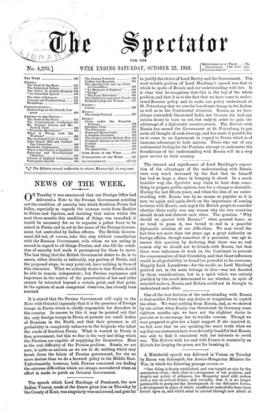The interest and significance of Lord Hardinge's exposi- tion of
the advantages of the understanding with Russia were very much increased by the fact that he himself has had so large a share in bringing it about. In a much humbler way, the Spectator may claim to have done some- thing to prepare public opinion here for a change so desirable. During the last fifteen years, and when the idea of an under- standing with Russia was by no means so popular as it is now, we again and again dwelt on the importance of coming to terms with Russia, and urged the British people to consider whether there really was any reason why the two countries should dread and distrust each other. The question, " Why should we quarrel with Russia ? " when pressed home, as we tried to press it, was bound to end in a peaceful diplomatic solution of our difficulties. We may recall the fact that not more than ten years ago a great authority on foreign affairs, though somewhat of a pessimist, was apt to answer this question by declaring that there was no real reason why we should not be friends with Russia, but that there were influences at work on the Continent to prevent the consummation of that friendship, and that those influences would in all probability be found too powerful to be overcome. Happily Lord Lansdowne—for the credit, as Lord Harding4 pointed out, in the main belongs to him—was not daunted by these considerations, but in a spirit which was entirely justified by the result determined to see whether, in spite of mischief-makers, Russia and Britain could not be brought to understand each other.














































